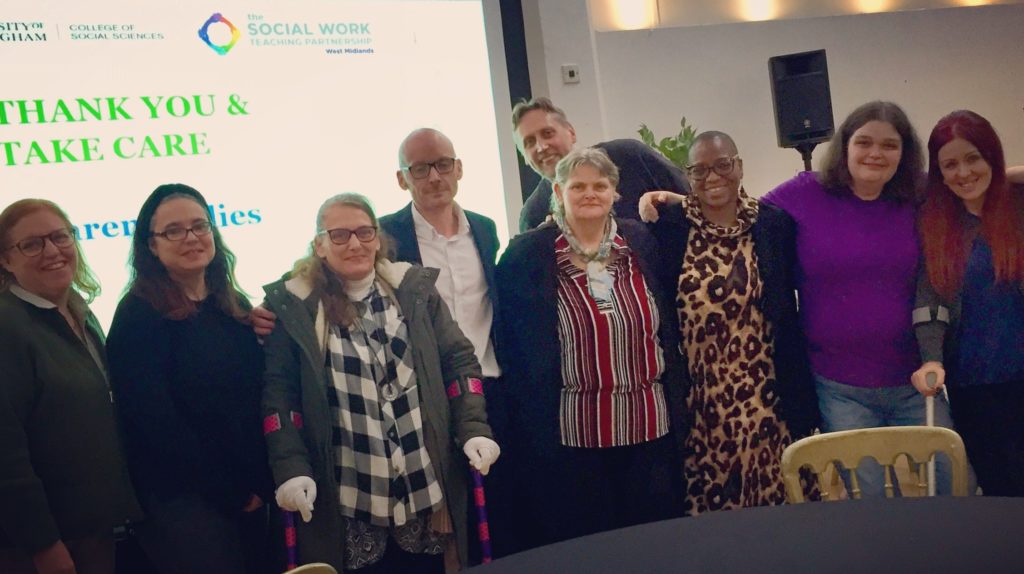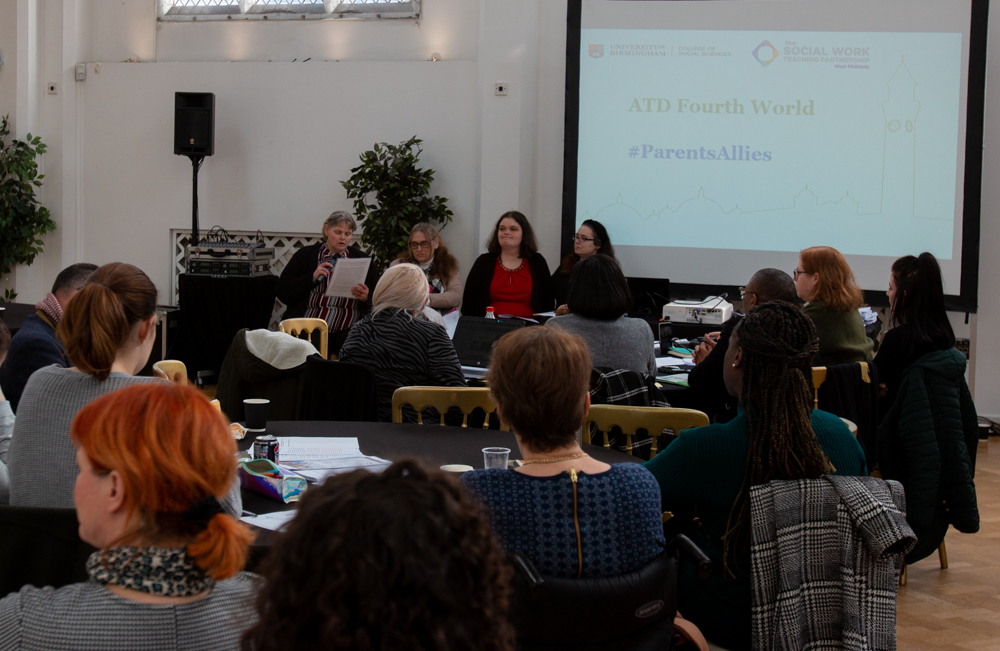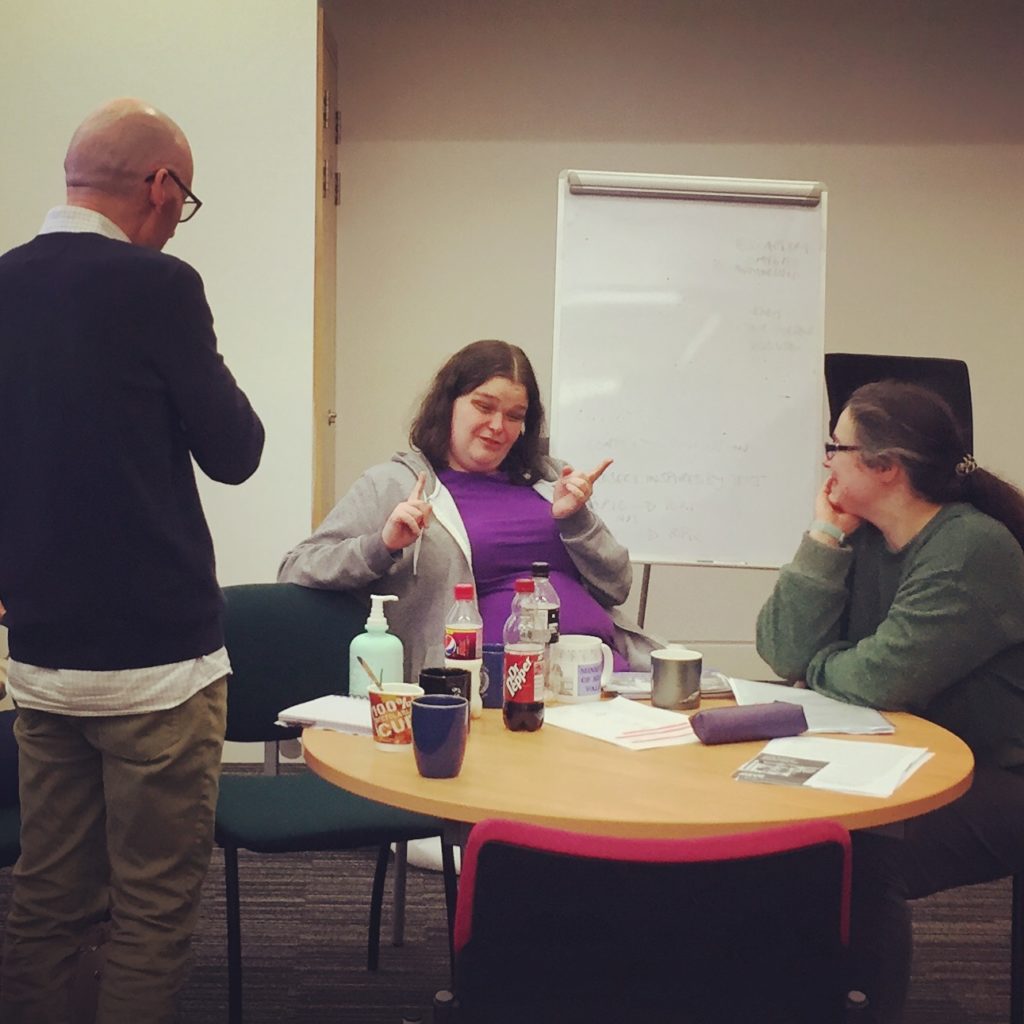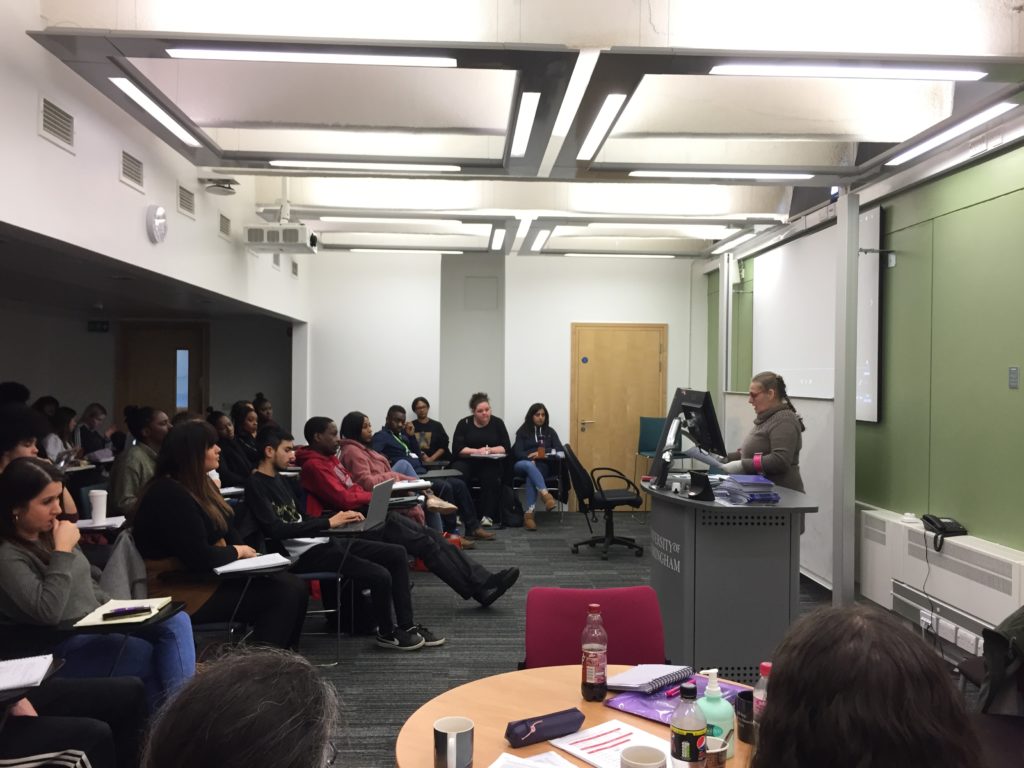Reforming the Child Protection System: Parents and Their Allies Together
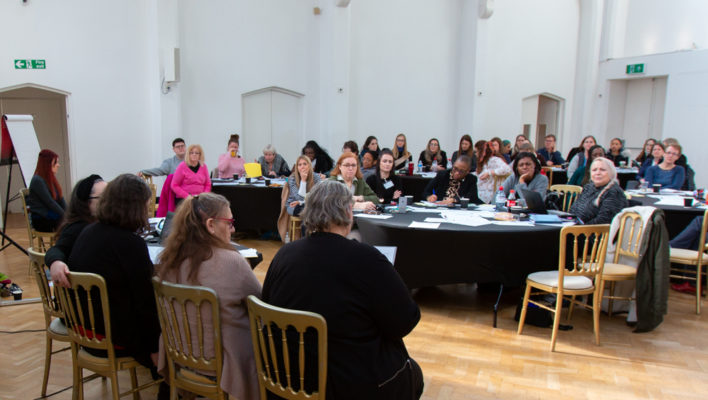
On 25 February 2020 in Birmingham, ATD Fourth World co-organised a conference with the Social Work Teaching Partnership of West Midlands on “Reforming the Child Protection System: Parents and Their Allies Together”.
During one of the panels of the conference, four speakers from ATD Fourth World described our approach to parent-led advocacy, peer support, and challenging the system together. One mother was speaking publicly for the first time. After watching how she was supported by her peers, social work practitioner Becca Dove remarked:
“We have just watched a stunningly beautiful masterclass on peer support and parent advocacy, side by side, supporting each other. In the social work profession, we make it too hard because we get paralysed by the complexities.”
Dove and her colleague Tim Fisher wrote more about this in their article, “Putting Lived Experience at the Heart of Child Protection“.
Below are the remarks of three of ATD’s speakers.
Amanda Button: The first thing that ATD Fourth World offers is what we call “parent-led advocacy”. A member of the ATD core team might not have lived experience of poverty. But the support they offer is not like the role played by professionals because the ATD advocate wants to be led by the parent in poverty who has requested support. That support could be coming along to a court proceeding, helping with correspondence, or helping with some aspect of family life. But it will always be because the parent requested it and made the choice about what’s most important to them. For example, a parent might have a question about what’s happening in court and feel too embarrassed to ask the solicitor. They might be more comfortable asking the ATD advocate. They might also ask the ATD advocate for advice—but they know it will always be up to them whether or not to follow the advice because they are the ones leading, while the ATD advocate will stay more in the background.
The second thing that ATD offers is our own network of peer support. Parents who have experience of family court proceedings know what other parents are going through. We can give advice or just be there with a shoulder to lean on. Moraene Roberts, who died last month, spent years offering support to our peers. Last year, she was looking back on her years of peer support. She was in a wheelchair and she felt bad that she had to stop visiting families because of that. But she’d give people her phone number. Especially when their child had just been taken away, she’d tell them, “If you need to phone me in the middle of the night, go ahead.”
We give each other peer support in other ways too. When we’re invited to speak out like at this conference, sometimes one of us will be taking the floor for the first time. So we prepare together. I know how scary it feels, so I’ve told others, “Take your time. Take a deep breath. And if you’re not sure about something, don’t worry because I’ll be next to you.”
The third thing ATD does is that together as peers we challenge the system. We do this through our social worker training project. Two or three of us activists with lived experience of interventions will go into a university to help prepare newly trained social workers to go out into the field. We don’t tell the students: “Do this, but don’t do that”. We just give them our perspective about what parents are going through. They read case files before they even meet someone for the first time, so we advise them to set the file aside. They need to get to know the family as people and to understand the barriers they are up against. In one university course, I asked the social work students: “If you were struggling and needed help, who would you turn to?” Some said their families, and some said they’d go to a doctor or a hospital. Not one of them said they’d go to social services to ask for help. So I asked why not? They said they were worried that they could have a child taken away. These were qualified social workers! I told them: “If that’s the case even for you, then put yourself in the shoes of the families you visit in the field. That fear is where the barriers come in. Parents are so afraid of having children taken away that some of them will speak to you in a tone that might be construed as aggressive or non-compliant. But it’s not that they’re not willing to work with the local authority. They’re just expressing anxiety.”
When we went back the following year, we saw the same students a year later. They thanked me for what I’d told them. They said it helped in their fieldwork. There were some people they’d been at loggerheads with, but now they were beginning to build a better relationship. It might just be by baby steps, but we move forward.
Charlotte: I have personal experience of family court proceedings. But what I want to tell you also comes from the experiences of other parents like me. Some people call us “birth mothers” but I prefer saying that we are “tummy mummies”.
With ATD Fourth World, we have “parent-led advocacy”. A lot of us don’t know where we would have been without that support. Social workers can decide that your child is at risk before he’s even born. Like if you’re in a domestic violence relationship, they worry that the violence will put the baby at risk — but they don’t offer any help to the mum to help her get out of that relationship. Sometimes even after a mum has ended the relationship, the social worker doesn’t realise it. And when a mum is getting abused emotionally or physically, it’s very hard to cope with things. During court proceedings, you don’t know how to show your emotions.
For example, when you’re in court, they use jargon and super complicated words. It’s very hard to know what they’re trying to say. Shaeda is an ATD family support worker who helps to explain everything. It’s the same with official letters. If you’re struggling with mental difficulties, or mental health, it’s very hard to understand letters about rent arrears. ATD can explain the letters and help you figure out what to do. Another example of how ATD can help is if your child is already adopted by someone else, you can create a life story for your child to get when they turn 5 or 6. The life story can explain with pictures and words what you went through to try to keep your child. But it’s hard to create the life story if you just don’t have a very good memory. So that’s also something Shaeda spends time helping tummy mummies with.
We also need a peer support network of people who have gone through the same thing. I’m new to this because it hasn’t happened before so I want to hear from friends who have already lived it.
Social services did send me to a group for birth mothers. At first, I was fitting in there — but new mums were introduced all the time and I found that hard. So I prefer the peer support from ATD. I’ve learned that I feel better when I’m with the same people and learning from their personal experiences. It really helps to hear Amanda and others being honest about how they’ve been through this themselves. And now I’m the advocacy person for a friend who had to go to housing court for rent arrears. I went to court with her, not to talk myself, but to be in her corner with her. Peer support means that we visit each other, and we chat on Facebook Messenger. With ATD, I learn about other things too, like a three-year research project that Amanda and others did. I’m seeing myself improve. Now my confidence has got stronger so that I can speak out like this.
We came to this conference because we want to challenge the system together as peers. This work is important to me because I heard that one borough changed their budget to give more support for keeping children at home with their families instead of just removing them. That hasn’t worked its way to where I live yet, but it’s so important because without that support, tummy mummies don’t have a chance. I think early support should be funded all over. And I think that if an unborn child is going to be put on the at-risk register, his mum should get support to get out of the abusive relationship. There should also be more support for mental health of children and also of parents. Too many people just suffer in silence. That’s why we’re here, to make sure that everyone can get support.
Tammy: Hi. I am a mum to four children: two boys aged 21 & 20, and two girls aged 14 & 16. I am a wife as well. I want to talk a little about the different ways ATD supports me and gets me involved.
Shaeda is a family support worker and advocate from ATD. She helps families with stuff they have going on in their lives; but she doesn’t tell us what to do. She supported us due to social services getting involved in our life. A couple of years ago, our daughters got put on a child protection plan because some professionals accused us of neglect. We felt we had done nothing wrong. We also felt that the professionals were prejudiced against us and didn’t try and understand our family and our situation.
Shaeda has accompanied us from the first referral right through court proceedings and continues to do so. Our children are now off child protection. Shaeda’s helped us to keep a level head. When you’re going through the process you don’t always understand what’s going on as you’re going through loads of different emotions. You go through upset, anger, feeling like a failure despite knowing you haven’t done anything wrong. And you worry about what’s going to happen and whether they will remove the children.
Shaeda was on our side and we knew that. She knew us and saw that what was written was wrong. The last three years have been a nightmare: dealing with the local authority and also dealing with our eldest daughter’s mental health at the same time. Shaeda was someone we could talk to about what was going on so we could get our heads around the legal jargon and properly understand what was happening.
I was often scared not to have understood things. It’s also hard to listen to what people are saying in the local authority meetings. You can get emotional and try hard not to show that you are angry. This is why you can miss what is being said. Shaeda took notes in all our meetings. Took the extra time to go through all the paperwork with us. She was someone that also understands our family.
Being a member of ATD Fourth World also allows you to meet other parents who have been going through similar things. It gives you a peer support network.
It’s like a sounding board and vice versa. You always have someone to talk to when you are having a bad day. It helps when there is someone at the other end of the phone, especially if they’ve been through it themselves.
Throughout the proceedings I had friends from ATD I could talk to when it was too much. A lot of my own friends outside ATD have not been through it. These other friends don’t understand it.
I have a couple of ATD friends who have been through care proceedings and I have been there for them as much as they have been there for me.
We both get the same out of it. We feel listened to, feel supported, and can give each other advice. One of my friends said that “she doesn’t know what she would have done without me” and thinks I am amazing, which is great to hear. For example, if she puts a status up saying “I have had enough and don’t want to talk to no-one ” most people would reply with “Are you ok? ” but I don’t do that. If anyone posts that type of thing – not just because of care proceedings but for other stuff too – I message them personally and I say: “What’s up?” I make a point of saying, “You don’t have to talk if you don’t want to. But just know I am here for you and my inbox is open and so is my phone if you want to ring instead.” That makes all the difference because it shows that you care and are not just being nosey.
ATD also brings parents like us together so we can think and take action; come to conferences like this and also help train social workers. I have been doing Social Worker Training from the beginning. It was strange at first because we were talking about our own experiences and how we felt social workers are and what should be different. As it’s gone on its changed and we made friends with social workers and we work together. And we learn from each other.
It’s very important to me because it is about reassurance and another way of not feeling alone. We are not alone in fighting the system. We have other professionals alongside us as well. Also we get to look at it from the other side because getting involved in training social workers helps you to understand things from a social worker’s point of view. You can look at it from their angle. They are under a lot of pressure from their managers.
Being involved in Social Work Training and study groups helped us to understand better our rights and to also understand what the system is like. Both parties need to not judge each other.
A recording of the livefeed of this panel begins at minute 18:37 of this video.
Since this conference in Birmingham, members of ATD Fourth World have contributed to social work training modules at Royal Holloway, University of London, and the University of Birmingham. Among the evaluations of the students were comments such as:
- “Definitely a privilege! This session was very thought provoking and enlightening. Today will definitely guide my social work career, especially the idea of taking a holistic family-support-focused approach.”
- “I absolutely love your charity and everything it stands for. Social work should be about human rights, social justice, and the individual. We need more lecturers like this, very impactful!”


